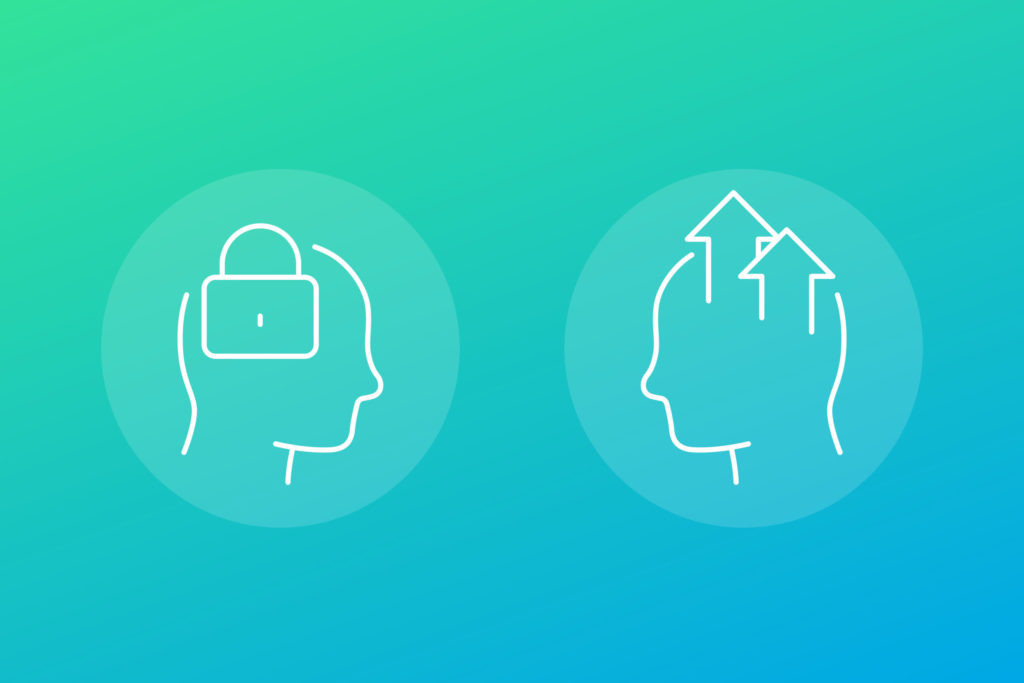“If you imagine less, less will be what you undoubtedly deserve” – Debbie Millman
In recent years, modern psychology has shown how belief systems about our own abilities can fuel our behavior and predict our success. Stanford psychologist Carol Dweck synthesized in her book, Mindset: The New Psychology of Success, that the power of our beliefs (both conscious and unconscious) and changing even the simplest of them can have profound impact on nearly every aspect of our lives.
One of the most basic principles we carry about ourselves is our belief in who we are and our personality traits. Are we “go-getters” or leaders? Are we good at working within teams or do we prefer to work independently? Do we take feedback well or do we avoid criticism? A lot of these question’s answers are based on how you see yourself and your personality or your mindset.
The Growth Mindset
A growth mindset isn’t just about growing your business and accepting more to gain more; a growth mindset means you are willing to accept new things that may challenge you so you can become better or more skillful.
You may be thinking, “of course I have a growth mindset” because no one wants to necessarily admit that they don’t support growth – but you may be more resistant to change than you think.
A growth mindset includes behaviors such as:
- Applying effort to acquire new skills
- Finding inspiration in others
- Perseveres when facing failure
- Embraces change and challenges
- Accepts criticisms
- A desire to learn
Another way to determine if you have a growth mindset is if you identify with any of the following thoughts:
- “Challenges help me grow”
- “Educating myself about new technology is exciting”
- “My effort and attitude determine my abilities”
- “I like to try new things”
Fixed Mindset
A fixed mindset can be easily described as your comfort zone; you know what you know so why change it, or “why fix what isn’t broken?”
A lot of people don’t realize that this kind of mindset is incredibly limiting, especially for hearing health professionals. Just like your patients need to adapt to their hearing aids, you need to adapt to the needs of your industry.
A fixed mindset includes behaviors such as:
- Avoids challenges
- Gives up easily
- Threatened by others success
- Cowers to challenges
- Resists change
- Ignores feedback
- Remains fixed on the old while avoiding anything new
Another way to determine if you have a fixed mindset is if you identify with any of the following thoughts:
- “Either I am good at it or I’m not”
- “If I don’t understand it immediately, I am not doing it”
- “If this takes too much time, I can’t do it”
- “I need to just stick to what I know”
Time to Adapt and Embrace Challenges
If the coronavirus pandemic taught us anything, it is the importance of adapting to change. But even without the coronavirus, change is bound to happen whether we like it or not.
One thing that is very true in hearing healthcare is that we are all used to remaining in our comfort zones. We perform a variety of evaluations, sell hearing aids, help patients with a variety of hearing conditions and try to keep our practices running smoothly. But if something changes and you can’t see patients in-person, your business is at risk for completely falling apart.
New technology and software can be very intimidating and is usually the number one thing that people resist, especially in the hearing healthcare field. But with the right service provider and partner, you can succeed and grow, regardless of the challenges you face. You can sell products. You can see patients virtually. You can completely streamline your business practices with new technology. You can thrive if you’re willing to accept new challenges as opportunities.
Conclusion
At the core, the difference between growth versus fixed is a passion for learning rather than a hunger for approval. Dweck writes:
“Why waste time proving over and over how great you are, when you could be getting better? Why hide deficiencies instead of overcoming them? Why look for friends or partners who will just shore up your self-esteem instead of ones who will also challenge you to grow? And why seek out the tried and true, instead of experiences that will stretch you? The passion for stretching yourself and sticking to it, even (or especially) when it’s not going well, is the hallmark of the growth mindset. This is the mindset that allows people to thrive during some of the most challenging times in their lives.”
If you want to thrive, Audiology Plus’s software for hearing health professionals will help you reach new heights at your practice. Contact us today to learn more.
Renee Shumaker, MA-A



